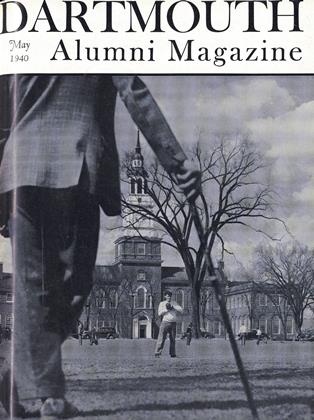byHarold O. Rugg '08. Ginn & Co. $1.88.
SOME YEARS AGO Harold Rugg decided it was time to scrap the texts which undertook to teach citizenship through memorizing the Declaration of Independence and the preamble to the constitution. He boldly attacked problems of modern democracy in a new series for the upper grades. They were so different from the old pussy-footing texts that most boards of education shied away from them. Dr. Rugg was called a disturber of the status quo, a parlor pink, a Socialist. But he persevered. As the books sold, newer editions became bolder in tone. This new volume is the best of the series so far. Some people will object to parts of it, for it furnishes an admirable background for Dartmouth's Social Science I, but if its lessons could be grasped by every American child, a long step forward would be taken toward making this country safe for democracy.
The book deals with the changing American family, its falling birth-rate and its rising tide of divorce; with lodges, clubs; with changing city governments. Crossing the Atlantic, Dr. Rugg explains Hitler, Stalin, Mussolini. He traces the history of representative government in America, paying his respects, en passant, to the Founding Fathers. He explains the ward heeler, the city, county, state boss. He shows our government not only as it is, but as it should be. He discusses crime, law enforcement, taxes. He demonstrates how public sentiment is created, how attitudes and prejudices are born. He closes with a vigorous plea for a new type of education, which will teach how the taxpayer's dollar is divided between the boss and the racketeer, rather than how a line is divided into mean and extreme ratio; the rules for choosing a city manager rather than those for writing Latin prose, and the story of Tom Dewey and Jimmy Hines rather than that of Pocahontas and Captain John Smith.
 View Full Issue
View Full Issue
More From This Issue
-
 Article
ArticleDartmouth Mourns Passing of Craven Lay cock
May 1940 -
 Article
ArticleI Found Seven Latinos
May 1940 -
 Article
ArticleJohn M. Mecklin, Teacher
May 1940 By Thomas W. Braden '40 -
 Class Notes
Class Notes1915*
May 1940 By CHARLES R. TAPLIN, RUSSELL B. LIVERMORE -
 Article
ArticleHanover Browsing
May 1940 By HERBERT F. WEST '22 -
 Class Notes
Class Notes1918*
May 1940 By ERNEST H. EARLEY, H. WARREN WILSON
Louis P. Benezet '99
-
 Letters to the Editor
Letters to the EditorAstronomer Fox '02
March 1936 -
 Letters to the Editor
Letters to the EditorLetters
January 1954 -
 Books
BooksOUTPOSTS OF THE PUBLIC SCHOOL
April 1939 By Highly Recommended, Louis P. Benezet '99 -
 Books
BooksTHE FINANCING OF GRANT-AIDED EDUCATION IN ENGLAND AND WALES
June 1940 By Louis P. Benezet '99 -
 Books
BooksTHAT MEN MAY UNDERSTAND
May 1941 By Louis P. Benezet '99 -
 Books
BooksAMERICAN SCHOOLS, A CRITICAL STUDY OF OUR SCHOOL SYSTEM,
October 1943 By Louis P. Benezet '99
Books
-
 Books
BooksVolume three of the Dictionary of American Biography, published
January, 1930 -
 Books
BooksLight, If Not Warmth
DECEMBER 1982 By Gene H. Stollerman '41 -
 Books
BooksTHE BRITISH ATTACK ON UNEMPLOYMENT
March 1935 By H. F. R. Shaw -
 Books
BooksWILD TRAIN: The Story of the Andrews Raiders
January 1957 By HERBERT F. WEST '22 -
 Books
BooksBull Market
September 1975 By JOHN HURD '21 -
 Books
BooksTHE MYTH OF THE MIDDLE CLASS NOTES ON AFFLUENCE AND EQUALITY
APRIL 1973 By KENNETH PAUL '69

